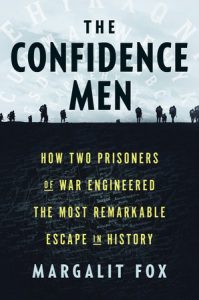Writing The Confidence Men: Margalit Fox
By Margalit Fox
 My new book, The Confidence Men, chronicles the most remarkable tale I’ve ever had the privilege of telling: the true story of a prison break so bizarre it should never have worked. But what delighted me as keenly as the story itself was the fact that I’d encountered it completely unexpectedly—poring over a dusty, long-out-of-print book looking for something else.
My new book, The Confidence Men, chronicles the most remarkable tale I’ve ever had the privilege of telling: the true story of a prison break so bizarre it should never have worked. But what delighted me as keenly as the story itself was the fact that I’d encountered it completely unexpectedly—poring over a dusty, long-out-of-print book looking for something else.
The book was Grand Deception: The World’s Most Spectacular and Successful Hoaxes, Impostures, Ruses and Frauds, a 1955 anthology edited by Alexander Klein. In 2018, in search of background material for a possible new book, I took it down from the shelves of my home library, where it has long had pride of place.
I’d been thinking of writing a book about pathological imposters—people like Frank Abagnale, of Catch Me if You Can fame, or Ferdinand Demara, the subject of Robert Crichton’s nonfiction book The Great Imposter and the Hollywood film of that name, starring Tony Curtis. But what caught my eye as I paged through Klein’s volume was an essay with an irresistible title: “The Invisible Accomplice.”
The essay was by a Welshman named Elias Henry Jones, and it recounted a real-life caper so astonishing it gave me goosebumps: During World War I, Jones and a fellow officer, Cedric Hill, broke out of a remote Turkish prisoner-of-war camp without tunnelling, using weapons or resorting to violence—the stuff of traditional prison-camp escapes. Instead, they sprang themselves from Yozgad, a P.O.W. camp high in the mountains of Anatolia … by means of a Ouija board.
Their escape plot—an ingeniously planned, daringly executed confidence game worked little by little on their Ottoman captors—was an elaborate piece of participatory theater entailing phony séances, magical illusions, secret codes and a hunt for buried treasure, with clues that appeared to have been planted by ghosts. If all went according to plan, the camp’s iron-fisted commandant would gleefully escort Jones and Hill along their escape route, with the Ottoman government paying their travel expenses. If their ruse was discovered, it would mean execution.
Jones’s essay, first published in the 1930s and reprising his adventure in brief, led me to his book-length memoir, The Road to En-dor. Published in 1919, it was intended as a cautionary tale about how easy it is to become a spiritualist charlatan, a species of war profiteer that flourished between 1914 and 1918 to wring dividends from gold-star families. (His title is a nod to “En-Dor,” Rudyard Kipling’s bitter poem of 1919. In it, Kipling, who had lost a son in World War I, decries such mountebanks: “The road to En-dor is easy to tread/For Mother or yearning Wife./There, it is sure, we shall meet our Dead/As they were even in life. …” Kipling’s title invokes the biblical Witch of Endor, from the First Book of Samuel, whom Saul asks to conjure Samuel’s spirit.)
If Jones’s essay gave me goosebumps, his book nearly made my hair stand on end, for the full story of his escape was rife with cunning, danger and moments of high farce that rival anything in Catch-22. The plan seemed born of a fever dream: Using a handmade Ouija board, Jones and Hill would regale their captors with a tale—seemingly channeled from the spirit world—designed to make them delirious to lead the pair out of Yozgad. The ruse would also require our heroes to perform feats of legerdemain, feign mental illness, stage a double suicide attempt that came perilously close to turning real, and endure six months in a Turkish insane asylum, an ordeal that drove them to the edge of actual madness. And yet in the end they won their freedom.
Forget pathological imposters—this was my story! Or was it? Before I could even consider writing my own book, I had to rule out the existence of books on the same subject by other authors. And so I spent a gut-churning hour—a compulsory first step that every nonfiction writer knows all too well—trolling the Library of Congress catalogue and other websites for traces of any book besides Jones’s.
To my astonished joy, there had been only one: Hill’s own memoir, The Spook and the Commandant, published posthumously in 1975. It, like Jones’s, was now largely forgotten. I realized that with the benefit of a hundred years’ hindsight, I could write a nonfiction thriller that, by setting the caper in historical and psychological context, explained exactly why this mad scheme worked in the face of all odds.
So began my enraptured involvement with Jones and Hill’s story—one of the only known instances of a con game being used for good instead of ill. (On reading my proposal for The Confidence Men, my longtime literary agent, an elegant, erudite woman in her 70s, burst out: “Is this for real? These guys are wild!” I was happy to tell her that yes it is, and yes they are.) To my delight, Hilary Redmon, the executive of Random House and my editor for the last three of my books, was as captivated by the caper as I was.
What I came to love most about this tale was its unlikely pair of heroes—men who almost certainly would not have met otherwise. Jones, an infantryman, was the Oxford-educated son of a British lord; Hill, a flier and skilled amateur magician, was a mechanic on an Australian sheep station. Yet for both of them the road to Yozgad had been replete with hardship: for Hill, a forced landing and six-hour shootout on the Sinai Peninsula; for Jones, a desperate five-month siege in Mesopotamia followed by a forced march through two thousand miles of brutal country on which scores of men would die.
In pain, loneliness, hunger and isolation, these two men formed an intellectual and emotional bond that very likely saved their lives. The nature of that bond is beautifully captured in a passage from Jones’s memoir that brings tears to my eyes every time I read it:
“For a brief period,” he wrote, recalling their six-month confinement in the madhouse, “Hill was put in the bed next mine. It seems a little thing, that we should lie there three feet apart instead of ten, but it meant much. . . . We did not attempt to talk—we were too closely watched for that—but at night, under cover of darkness, sometimes he and sometimes I would stretch out an arm, and for a brief moment grip the other’s hand. The firm strong pressure of my comrade’s fingers used to put everything right.”—
—
Margalit Fox (@margalitfox) is a former senior writer at The New York Times. Her new book, The Confidence Men: How Two Prisoners of War Engineered the Most Remarkable Escape in History, will be published by Random House on June 1. A resident of Manhattan, she is the author of three previous narrative nonfiction books, Conan Doyle for the Defense, The Riddle of the Labyrinth and Talking Hands.
Find out more about Margalit on her website: http://margalitfox.com/
THE CONFIDENCE MEN
 The astonishing true story of two World War I prisoners who pulled off one of the most ingenious escapes of all time.
The astonishing true story of two World War I prisoners who pulled off one of the most ingenious escapes of all time.
“A wonder, a marvel, a feat of invention and dogged persistence, and most of all, a testament to the power of the human capacity to believe.”—Liza Mundy, author of Code Girls: The Untold Story of the American Women Code Breakers of World War II
Imprisoned in a remote Turkish POW camp during World War I, having survived a two-month forced march and a terrifying shootout in the desert, two British officers, Harry Jones and Cedric Hill, join forces to bamboozle their iron-fisted captors. To stave off despair and boredom, Jones takes a handmade Ouija board and fakes elaborate séances for his fellow prisoners. Word gets around, and one day an Ottoman official approaches Jones with a query: Could Jones contact the spirit world to find a vast treasure rumored to be buried nearby? Jones, a trained lawyer, and Hill, a brilliant magician, use the Ouija board—and their keen understanding of the psychology of deception—to build a trap for their captors that will ultimately lead them to freedom.
A gripping nonfiction thriller, The Confidence Men is the story of one of the only known con games played for a good cause—and of a profound but unlikely friendship. Had it not been for “the Great War,” Jones, the Oxford-educated son of a British lord, and Hill, a mechanic on an Australian sheep ranch, would never have met. But in pain, loneliness, hunger, and isolation, they formed a powerful emotional and intellectual alliance that saved both of their lives.
Margalit Fox brings her “nose for interesting facts, the ability to construct a taut narrative arc, and a Dickens-level gift for concisely conveying personality” (Kathryn Schulz, New York) to this tale of psychological strategy that is rife with cunning, danger, and moments of high farce that rival anything in Catch-22.
Category: On Writing
























